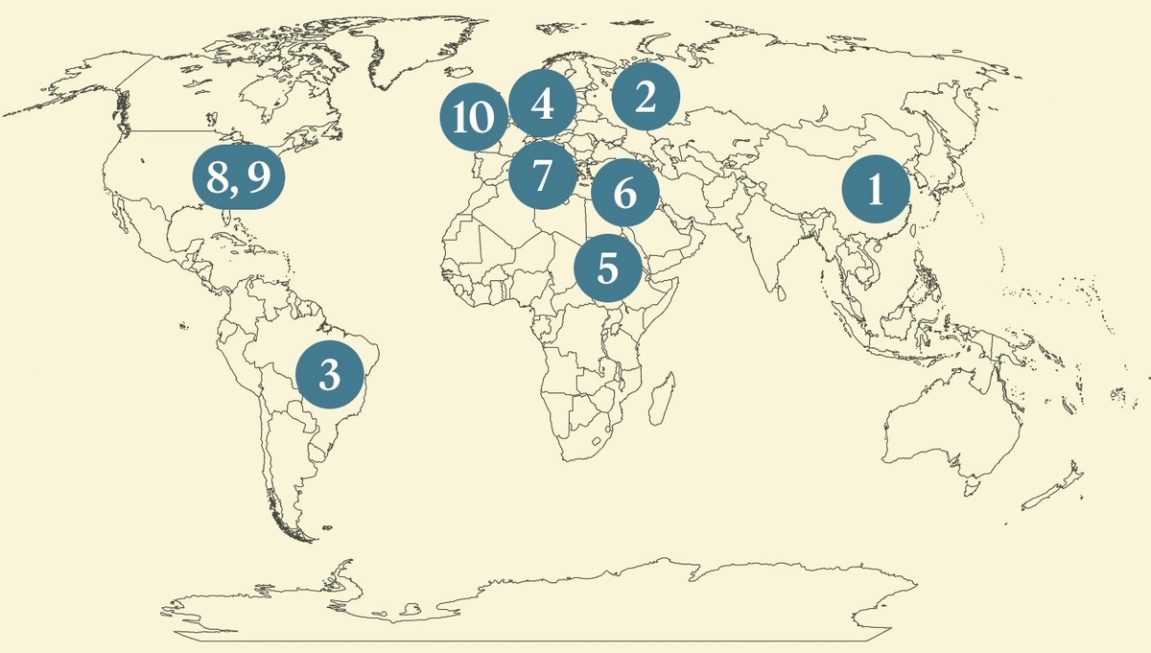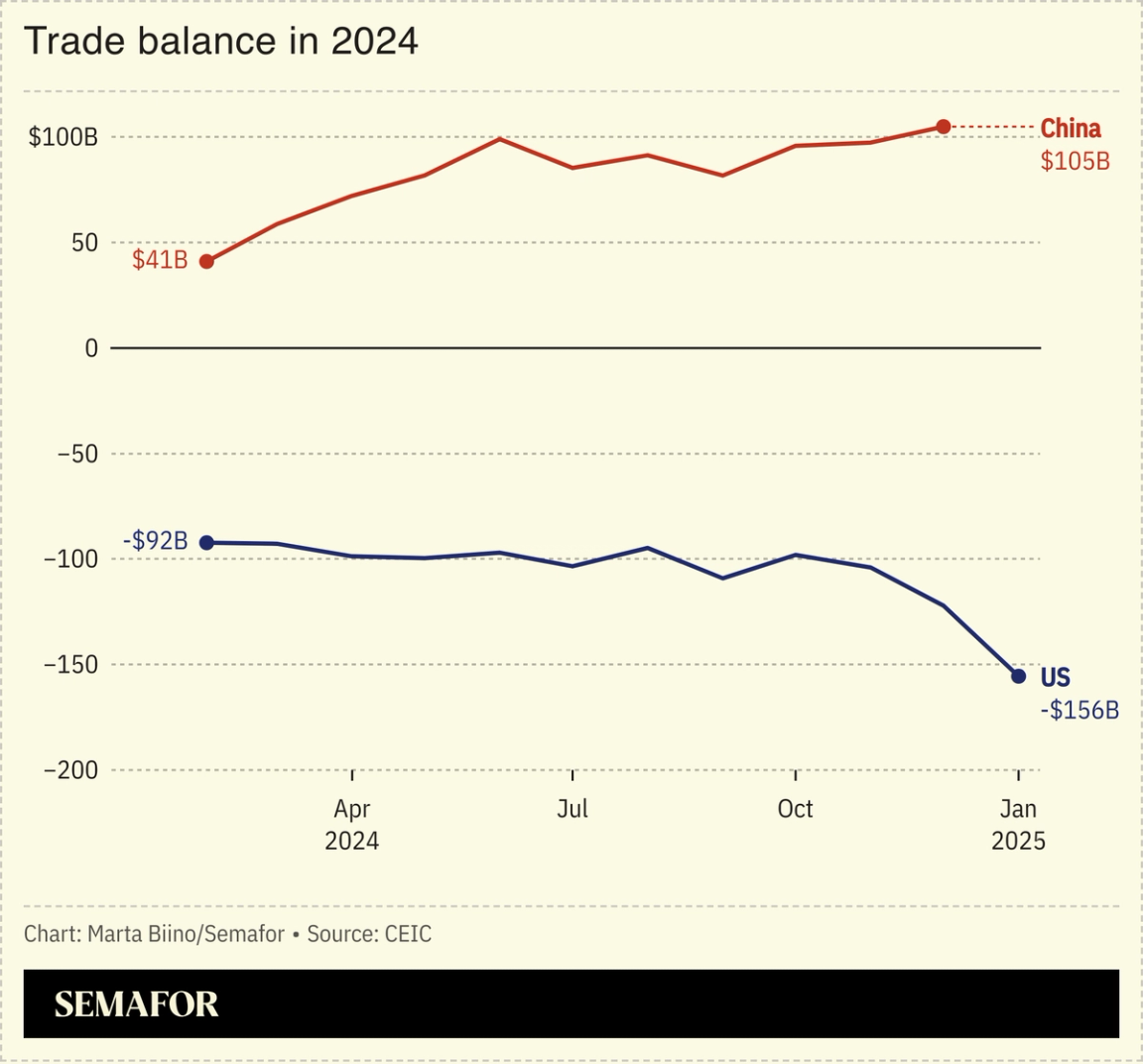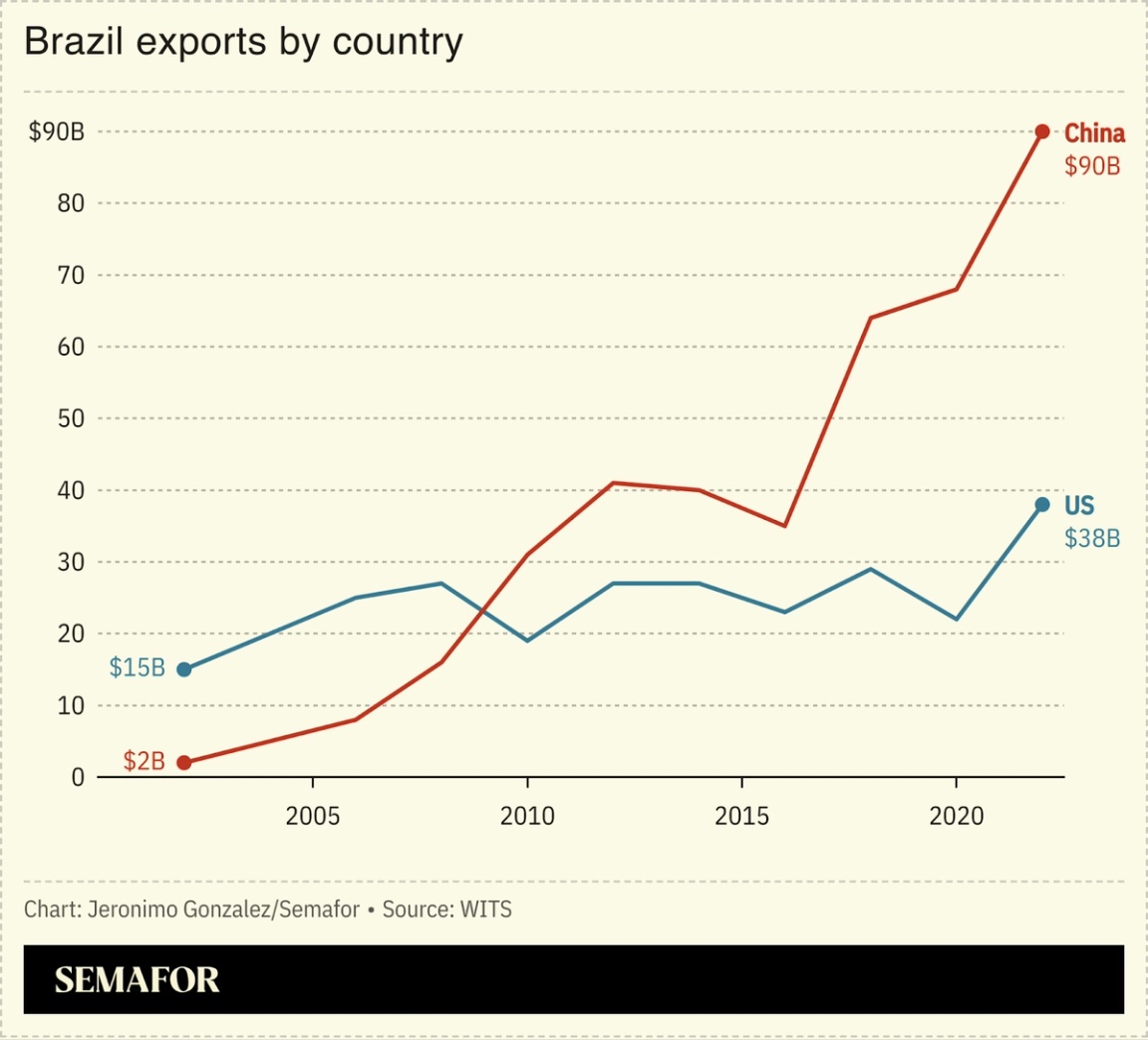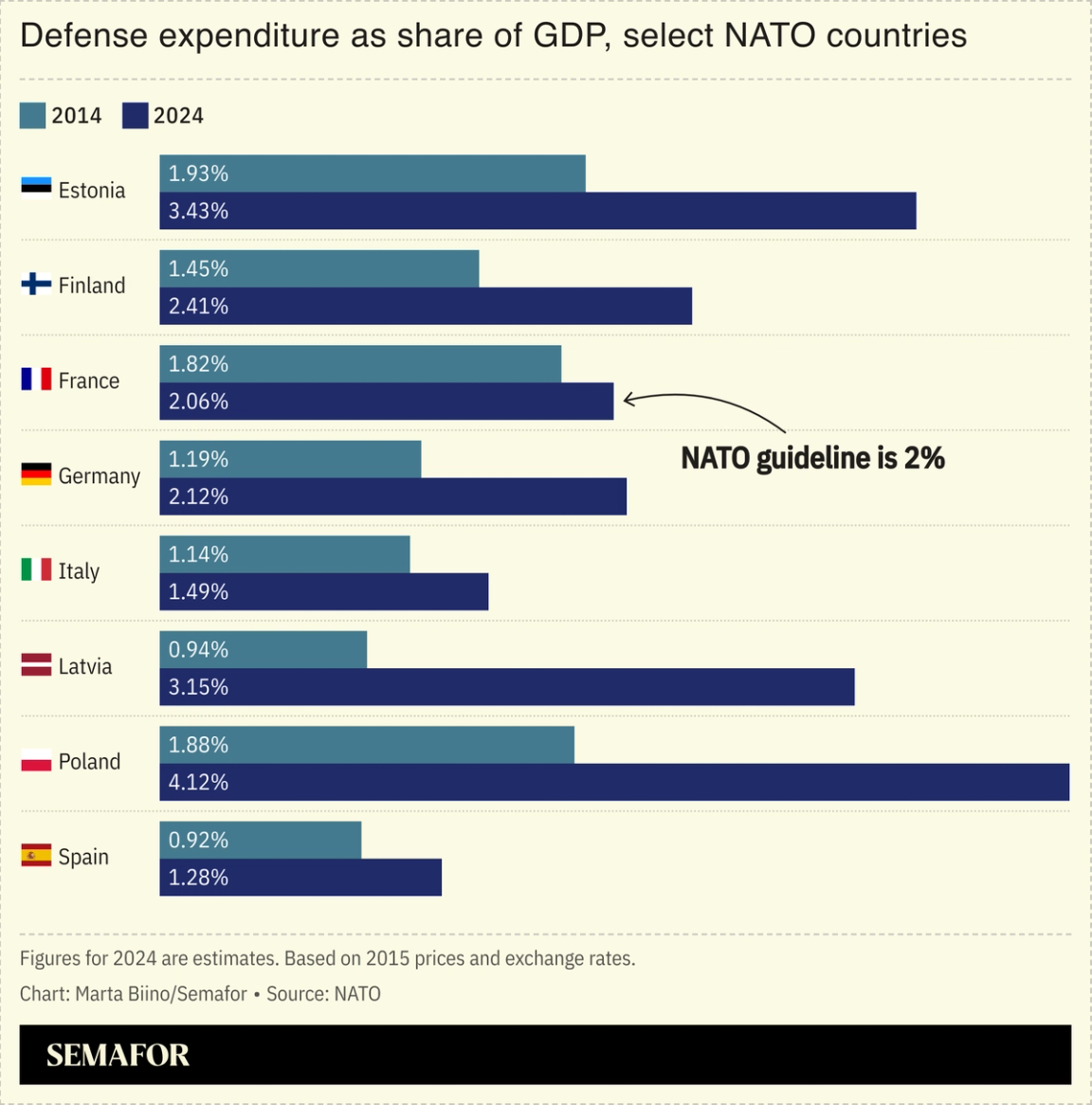| | China’s trade data is unexpectedly buoyant, the geopolitics of Putin’s Victory Day parade, and Brita͏ ͏ ͏ ͏ ͏ ͏ |
| |   Port Sudan Port Sudan |   Moscow Moscow |   Gaza City Gaza City |
 | Flagship |  |
| |
|
The World Today |  - China’s buoyant trade data
- Putin’s Victory Day parade
- Lula visits Moscow
- German arms resurgence
- Sudan drone strikes
- US backs Gaza truce talks
- US pope, US politics
- Trump’s tax hike proposal
- RSV hospitalizations down
- Britain’s TV heft
 There may soon be moose loose aboot this (UK) hoose, and recommending a classic work from the venerable David Attenborough. |
|
China’s buoyant trade data |
 China’s exports grew faster than expected despite plummeting shipments to the US, pointing to the fast-changing shape of global trade as a result of hefty American tariffs. The latest figures were largely driven by Asian manufacturers importing Chinese raw materials to produce goods ultimately bound for the US ahead of fresh tariff rises due in July. The data also indicates that Chinese companies’ “efforts to pivot to other markets are paying off,” ING economists noted, with sales to Japan and Europe accelerating. Washington is reportedly mulling offering substantial tariff cuts as part of talks with Beijing this weekend, but the legacy of its punishing levies may be new trade patterns of which the US is not a part. |
|
Russia hosts Victory Day parade |
 Vladimir Astapkovich/Host agency RIA Novosti/Handout via Reuters Vladimir Astapkovich/Host agency RIA Novosti/Handout via ReutersRussia hosted two dozen foreign leaders for a Victory Day parade that showcased Moscow’s growing global acceptance despite its invasion of Ukraine. The leaders of Brazil, China, Indonesia, and several ex-Soviet republics took part, transforming an event that had in previous years underscored Moscow’s relative isolation into a “propaganda exercise” for Russian President Vladimir Putin, CNN said. A separate meeting, meanwhile, pointed to the wider international battle over the legacy of World War II: Fifteen EU foreign ministers and the bloc’s diplomatic chief visited Lviv in Ukraine, seeking to establish a tribunal to prosecute Kremlin leaders over the war. “In Moscow, they’re trying to resurrect an empire,” Politico wrote. “In Lviv, they’re trying to resurrect the international order.” |
|
Lula’s tricky geopolitical balance |
 The Brazilian president’s visit to Russia this week showed him to be walking a diplomatic tightrope, seeking stronger ties with Moscow and Beijing while striving to keep the US on side. Luiz Inácio Lula da Silva, one of the few democratically elected leaders attending Russia’s Victory Day Parade, has largely refused to side with the West over the Ukraine war, and Brazil has increased trade with China, even as the left-wing leader has championed human rights which Moscow and Beijing flout. As a recent New Yorker profile noted, “It was not lost on him that Brazil, as a developing economy, depends on maintaining friendly relations, even when it means partnering with countries with wildly divergent value systems.” |
|
German firms embrace defense |
 Germany’s Mittelstand — the smaller businesses which make up most of its economy — is pivoting to defense. Europe’s largest economy is struggling, but military manufacturing is a rare growth area, thanks to US isolationism and a relaxation of German government borrowing rules. A chemical producer has shifted from fertilizer to explosives, the Financial Times reported, while a motor manufacturer began making engines for tanks as well as tractors. Since Russia’s 2022 invasion of Ukraine, Europe has stepped up military outlays: In that year, European Union member states spent $240 billion on defense; in 2024, $369 billion. Germany took longer than most to embrace higher spending: Arms manufacturing has long been taboo because of the Nazis’ legacy, but that political consensus is fraying. |
|
 Khalid Abdelaziz/Reuters Khalid Abdelaziz/ReutersDrone strikes hit a Sudanese army stronghold that has been the main gateway for international aid into the conflict-wracked country. Khartoum blamed the paramilitary Rapid Support Forces for carrying out days of attacks on Port Sudan, which has escaped the worst of Sudan’s civil war and become a refuge for displaced families and aid workers. In addition to worsening the country’s humanitarian catastrophe, the strikes will “deepen regional tensions over the war,” an expert told The Washington Post: Sudan’s government has already suspended diplomatic ties with the UAE, which it accuses of backing the RSF, while Egypt and Saudi Arabia will view the drone attacks as “bringing the war to their Red Sea doorsteps.” |
|
US steps up Gaza truce efforts |
 The US stepped up efforts to reach a ceasefire in Gaza ahead of President Donald Trump’s visit to the Middle East next week. Washington has proposed a 21-day truce, The National reported, while Haaretz said the White House was pressing Israel’s government to agree a deal before Trump’s trip to Saudi Arabia, Qatar, and the UAE, which begins May 13. The negotiations come with the UN warning of worsening deprivation in Gaza, which has been subject to an Israeli aid blockade for two months, resulting in “dwindling supplies of everything from fuel to medicine.” American pressure may have limits, though: Hamas has said there is “no point in any negotiations” with the blockade in place. |
|
New pope may clash with White House |
 Augustinian Province of Our Mother of Good Counsel/Handout via Reuters Augustinian Province of Our Mother of Good Counsel/Handout via ReutersPope Leo XIV, the first American pope, was embroiled in US politics within minutes of his election. US President Donald Trump congratulated Chicago-born Robert Prevost — a registered Republican — on his election, but the new pope may clash with the White House. As a cardinal he criticized Vice President JD Vance for his stance on immigration, and has repeatedly condemned the Trump administration. Trump-supporters appeared unimpressed: One MAGA activist called Leo a “WOKE MARXIST POPE.” His selection represents a rejection of “intense lobbying [for] a pontiff sympathetic to President Donald Trump,” Time magazine argued, and his chosen papal name harks back to Leo XIII, the early-20th-century pope credited with kickstarting the Church’s acceptance of political modernity, the Financial Times wrote. |
|
 Clay Travis started his career with a stunt on his blog involving a pudding strike and NFL streaming rights. From roots in new media, he founded OutKick, a conservative sports and politics site that Fox Corp acquired in 2021. This week, Ben and Max bring on the outspoken entrepreneur to discuss how sports and conservative politics have become intertwined, how gambling and sports media have become intertwined, and how to attract an audience of men. They also ask about his current role as a Fox News personality and his 11 interviews with Donald Trump. Plus, he and Max duke it out over the NBA’s ratings. |
|
Trump eyes higher taxes for rich |
 Leah Millis/Reuters Leah Millis/ReutersUS President Donald Trump wants to create a new higher tax bracket for top earners, Semafor reported. He asked lawmakers to boost taxes to 39.6% on earnings above $2.5 million, partially rolling back one of his own tax cuts from 2017. Trump has been flirting with tax hikes for weeks, even if the proposal will make it harder for Republican leaders to pass a bill by their own July 4 deadline: The congressional party broadly favors lower taxes, although a populist segment has welcomed Trump’s move. The increase should also be seen in context: Pre-2017, the upper bracket began at $626,350, and the proposed bill will result in a reduced tax take. |
|
RSV hospitalizations down |
 UN Photo/David Ohana/Flickr UN Photo/David Ohana/FlickrUS hospitalizations for respiratory syncytial virus are down by about half from this time last year, likely thanks to a new vaccine and an antiviral drug. RSV is the biggest US cause of infant hospitalization, with an estimated 58,000 to 80,000 under-fives taken in for treatment each year, most during fall and winter. But this season was different, Ars Technica reported: Compared with the 2018-20 average, newborn hospitalizations fell 45% in one dataset and 52% in another, with smaller but comparable falls in older infants. The change is thought to be due to the introduction of a vaccine given to pregnant women in their third trimester and a new monoclonal antibody drug given to babies under eight months. |
|
|